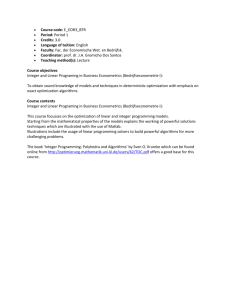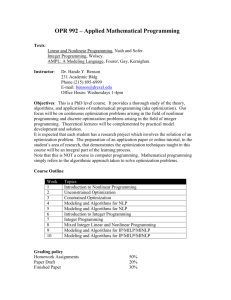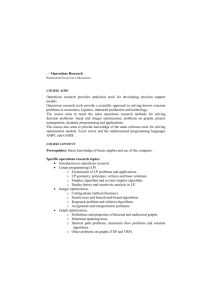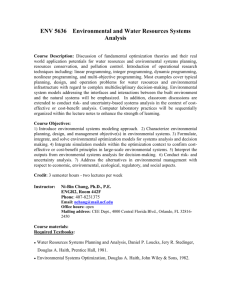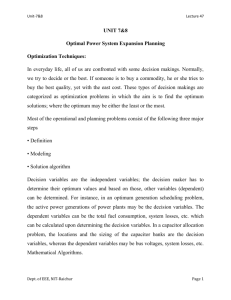Classification algorithms via integer optimization
advertisement
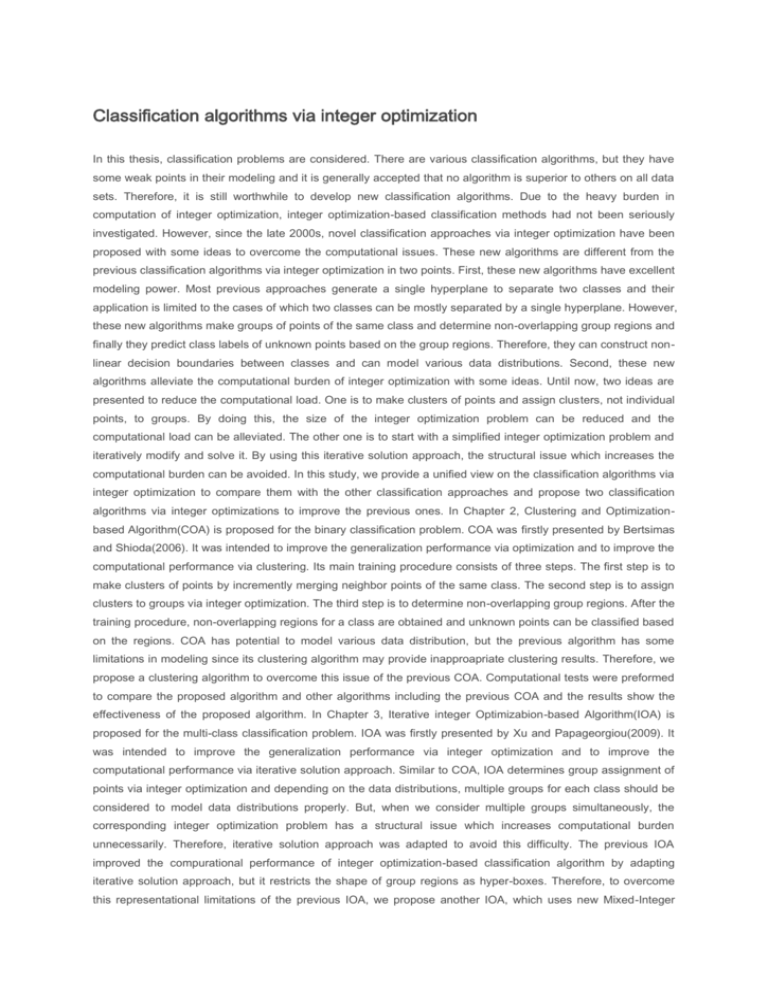
Classification algorithms via integer optimization In this thesis, classification problems are considered. There are various classification algorithms, but they have some weak points in their modeling and it is generally accepted that no algorithm is superior to others on all data sets. Therefore, it is still worthwhile to develop new classification algorithms. Due to the heavy burden in computation of integer optimization, integer optimization-based classification methods had not been seriously investigated. However, since the late 2000s, novel classification approaches via integer optimization have been proposed with some ideas to overcome the computational issues. These new algorithms are different from the previous classification algorithms via integer optimization in two points. First, these new algorithms have excellent modeling power. Most previous approaches generate a single hyperplane to separate two classes and their application is limited to the cases of which two classes can be mostly separated by a single hyperplane. However, these new algorithms make groups of points of the same class and determine non-overlapping group regions and finally they predict class labels of unknown points based on the group regions. Therefore, they can construct nonlinear decision boundaries between classes and can model various data distributions. Second, these new algorithms alleviate the computational burden of integer optimization with some ideas. Until now, two ideas are presented to reduce the computational load. One is to make clusters of points and assign clusters, not individual points, to groups. By doing this, the size of the integer optimization problem can be reduced and the computational load can be alleviated. The other one is to start with a simplified integer optimization problem and iteratively modify and solve it. By using this iterative solution approach, the structural issue which increases the computational burden can be avoided. In this study, we provide a unified view on the classification algorithms via integer optimization to compare them with the other classification approaches and propose two classification algorithms via integer optimizations to improve the previous ones. In Chapter 2, Clustering and Optimizationbased Algorithm(COA) is proposed for the binary classification problem. COA was firstly presented by Bertsimas and Shioda(2006). It was intended to improve the generalization performance via optimization and to improve the computational performance via clustering. Its main training procedure consists of three steps. The first step is to make clusters of points by incremently merging neighbor points of the same class. The second step is to assign clusters to groups via integer optimization. The third step is to determine non-overlapping group regions. After the training procedure, non-overlapping regions for a class are obtained and unknown points can be classified based on the regions. COA has potential to model various data distribution, but the previous algorithm has some limitations in modeling since its clustering algorithm may provide inapproapriate clustering results. Therefore, we propose a clustering algorithm to overcome this issue of the previous COA. Computational tests were preformed to compare the proposed algorithm and other algorithms including the previous COA and the results show the effectiveness of the proposed algorithm. In Chapter 3, Iterative integer Optimizabion-based Algorithm(IOA) is proposed for the multi-class classification problem. IOA was firstly presented by Xu and Papageorgiou(2009). It was intended to improve the generalization performance via integer optimization and to improve the computational performance via iterative solution approach. Similar to COA, IOA determines group assignment of points via integer optimization and depending on the data distributions, multiple groups for each class should be considered to model data distributions properly. But, when we consider multiple groups simultaneously, the corresponding integer optimization problem has a structural issue which increases computational burden unnecessarily. Therefore, iterative solution approach was adapted to avoid this difficulty. The previous IOA improved the compurational performance of integer optimization-based classification algorithm by adapting iterative solution approach, but it restricts the shape of group regions as hyper-boxes. Therefore, to overcome this representational limitations of the previous IOA, we propose another IOA, which uses new Mixed-Integer Programming(MIP) models for the group assignment and a new classifying procedure. To compare the proposed IOA with other algorithms including the previous IOA, computational tests were conducted and the results show the effectiveness of the proposed algorithm.
